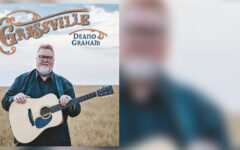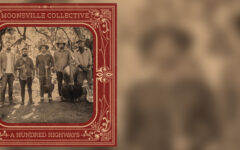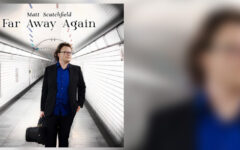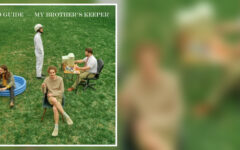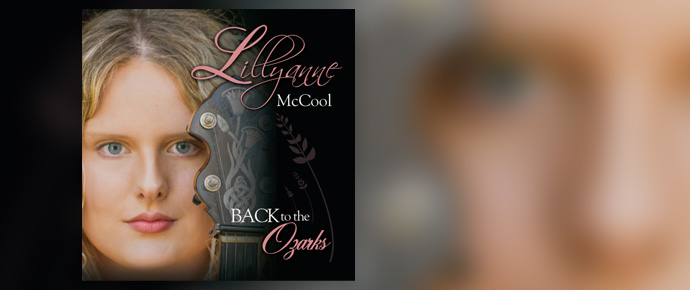
I have never been to the self-acclaimed Folk Music Capital of the World, Mountain View, Arkansas, but after hearing 17 year old Lillyanne McCool’s album, Back To The Ozarks, I feel that I have been whisked away to the rugged beauty and culture that is deeply rooted in the vision of this album.
Lillyanne McCool is a bluegrass/old-time musician, singer, and songwriter from Mountain View. She has been making waves in the acoustic world with her debut solo album, Back To The Ozarks, which was released on December 15th, 2020. Having grown up in a musically inclined family and community, you could say that she has been surrounded by music from the very beginning. This left no question as to whether she would ever start playing music, but only as to when she would start. She attended her first jam at just 1 day old, and attended her first show on stage at 6 days old; when her mum (Crystal McCool) wore her in a bag across her back while she played the bass.
Lillyanne started learning banjo through a school program called Music Roots that provides students from 4th to 8th grade with free lessons to study the American folk instrument of their choice. She credits her many teachers over the years, each with their own unique style that has strongly contributed to her own. Having grown up in the self-proclaimed “Folk Music Capital of the World,” she appreciates and has greatly benefited from the rich heritage and understanding of both old-time music and old-time ways.
Although she started out playing open back banjo for old-time music, her overall approach to music has not been solely influenced by one genre. This can most definitely be heard in her newest release. She works hard to produce and develop a blend of both bluegrass and old-time, through the use of a resonator and open back that she plays both with precision and taste. This mix of bluegrass and old-time music may be distasteful to some, but Lillyanne shows that it is possible for the two styles to exist together in harmony.
Over the years, she’s played in many bands, including The Bigfoot Stompers, Upjumpers, and Twang All Girl String Band. More recently in 2018, Lillyanne won 1st place in the National Old-Time Banjo Competition.
Produced, mixed, and mastered by Jon Raney at Raney Recording Studio in the neighboring town of Drasco, Arkansas, Back To The Ozarks is filled with a deep heritage and nostalgic tones, whilst still bringing us a youthful energy with a refreshing sound. There are influences of driving bluegrass with glimpses of Rhonda Vincent and Alison Krauss, but also the whimsical old-timey ruggedness of Gillian Welch.
Each track seamlessly alternates between Lillyanne’s fiery old-time banjo playing and her easy listening straight ahead bluegrass numbers. Upon first listen, you can tell that every song has been carefully handpicked in consideration to the significance of the Ozark Mountains. It’s wonderful to see Lillyanne carrying the musical baton of her culture and traditions, that will in turn inspire many aspiring young musicians after her to do the same.
The lineup of musicians featured on these tracks alternates throughout the album. The core band includes Lillyanne on banjos and lead vocals, her parents Jackie and Crystal McCool on rhythm guitar, bass and harmony vocals, Turner Atwell on lead guitar, along with alternating guest appearances from Mary Parker and Emily Philips on fiddle and Clinton Johnson and Jared Keen on mandolin.
The first track kicks us right into the old-time vein of the album with a rip roaring version of the traditional song, Hop High, also known as Hop High My Lulu Gal. The tight rhythmic drive of clawhammer banjo and old-time fiddle really move this track along, making it the perfect opener. Next we are introduced to Crystal and Lillyanne McCool’s songwriting collaboration with the title track, Back To The Ozarks. Traces of early Alison Krauss come to mind upon first listen, with fiddle and banjo crisscrossing delicately around the vocal phrases. Crystal and Lillyanne paint a beautiful picture of the landscape and timeless culture of the Ozarks in the lyrics, doing a wonderful job of putting us into their shoes and what it’s like to be missing the hills of home.
For the third track we’re thrown right back into the old-time realm with a stomping good fiddle and banjo duet on Garfield’s Blackberry Blossom. Fellow banjo player and builder, Lucas Pool, showed Lillyanne this tune, and she later learned it from Adam Hurt. She is joined by Arkansas State Old-Time Fiddle Champion, Emily Philips, on this track for a short but sweet version of this great modal traditional number.
Just To Hear You Call Me Darlin’ reintroduces us to Crystal and Lillyanne’s songwriting, which pays homage to the straight ahead bluegrass influence so deeply rooted in the McCool family. There are few sounds that compare to mother and daughter singing together, with Crystal’s harmonies blending effortlessly with Lilyanne’s sweetly delicate lead. Written from the perspective of a girl who has been guarding her heart from a relationship with any suitors, but ends up falling head over heels for a special man who has clearly stolen her heart. Self-described as, “Beauty and the Beast mixed with a Hallmark Christmas movie.”
From contemporary bluegrass romance to a mix match of instrumental old-time and bluegrass, we are swiftly whisked away to a blazing Glory In The Meeting House, arranged by Lillyanne to clearly show how bluegrass and old-time can mix stylistically to create something refreshing and youthful. The mandolin backbeat and consistency of the bass play heavily on this track, providing a progressive texture to the driving fiddle and banjo.
Whole World ‘Round is one of the few covers handpicked for the album, and Lillyanne could not have picked a better song to sum up her admiration for the Ozarks, written by Mitch Jayne and Joe Stuart, and recorded by The Dillards (popularly known for their appearance as The Darlings on The Andy Griffith Show). Not only does this song refer to the longing of going home to the hills, but also the feelings of wanting to escape from a flat or barren landscape, something which we listeners might be able to relate to. After we’ve traveled the whole world ’round, we fly right back into a scorching old-time version of the traditional tune, Last Chance. We are swept away to a late summer’s night jam session where this tune could last 15 minutes easily. This track leaves us wanting more, so we might as well put it on repeat and dance away to this great version.
Behold The Lamb features Lillyanne’s father, Jackie McCool’s, songwriting. He recorded the song with his prior bluegrass Gospel band, Lifted Up, when she was five years old. The band was made up of her mum, Crystal, her dad, Jackie, and Clinton Johnson who is featured on mandolin throughout this project. After hearing this song all through her childhood she knew she had to record it for this project.
We move back into the instrumental realm with a beautiful 3 finger original composition of Lillyanne’s called Grace Anne. She wrote it amidst the noise and chaos of 2020, which is proof of her attention to detail and creative ability. Lillyanne describes it as, “a tune that sounds as if it belongs in a fairytale, but carries a sense of nostalgia with it.” This description not only fits this tune, but Back To The Ozarks as an album. In that same vein of nostalgia yet adventure, we move on to Raining In The Ozarks. Written by Crystal McCool before Lillyanne was born. This was another of her parents’ songs that she grew up hearing and loving. The rhythmic tempo of this track was indeed inspired by the Ozark rain.
The well loved traditional tune, Angelina Baker, is one that I’m sure readers will recognize, but how often have you heard it with old-time banjo and 3 finger banjo played by the same picker? Lillyanne does a great job arranging and playing this old tune, whilst giving it new life and an exciting energy.
The final track, When The Music’s Done, written by Crystal and Lillyanne, is a standout track on this album. With just lead vocals from Lillyanne, piano and harmony vocals from Crystal, and fiddle by lifelong friend Mary Parker, its subtle instrumentation pays homage to the story and lyrics behind the song. Lillyanne and Crystal began writing this song as a tribute to two bandmates and close friends of Lillyanne’s (from Twang All Girl String Band) who were heading off to college. This move would leave Lillyanne and her remaining bandmate in an inactive group. Turns out at the same time, the COVID-19 pandemic had just surfaced and their region went into lockdown. She says that, “The song not only resonates with the end of a band, but also the end of festivals, camps, and contests that she had participated in year after year.” The song took on new meanings when she started hearing of the loss of close friends during the pandemic. The sentiment and emotion put into each line conveys the remembrance of loved ones, and pays homage to the days gone by.
This album as a whole, is one that I’m sure will not only be treasured by Lillyanne’s local community, but also with old-time and bluegrass fans across the globe. The fact that she has pulled off releasing an album filled with performances and compositions inspired by the old-time and bluegrass communities within the rich culture of the Ozarks, is something that should not be taken lightly. Wonderful playing, great writing, and refreshing stories makes this album a great addition to anyone’s CD collection.
For more information about Lillyanne McCool, visit her website. Her new album is available from a number of music retailers.

